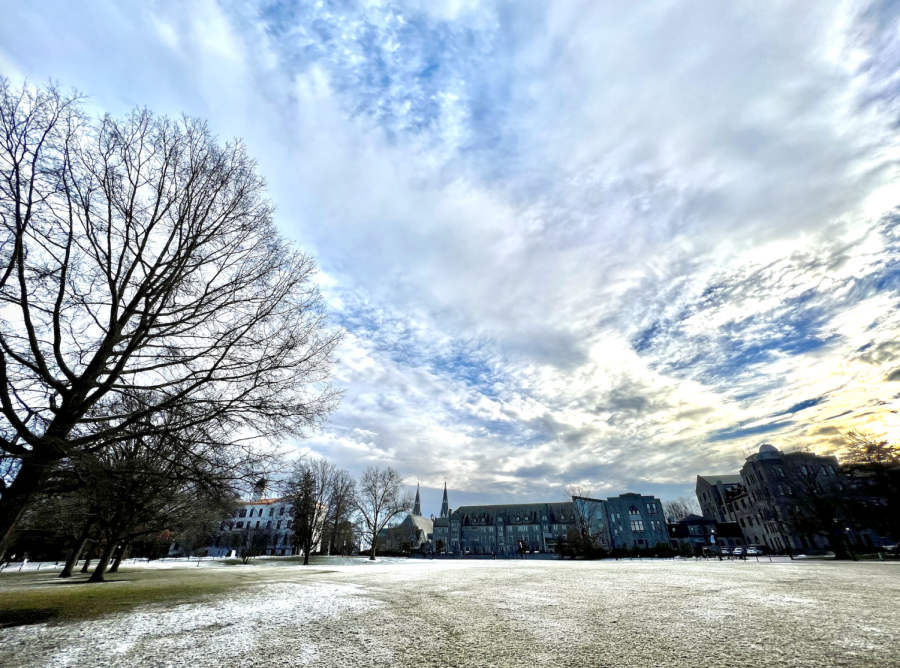Villanova Continues to Listen to Science
Villanova followed the science and mandated a third booster shot for students.
January 29, 2022
Villanova needs to continue to listen to science. For the spring 2022 semester, the University asked its students to receive a third Covid-19 shot, a booster, no later than Jan. 31.
If we don’t abide by the University’s mandate, we as a school are at risk of getting sick, going online, and continuing the spread of Covid-19. This past semester has been the first taste of college for so many students, why ruin it?
The University is partnering with Rite Aid to hold its own booster clinic in Dougherty Hall, where students can receive their boosters on-campus over the next few weeks. The clinic will offer all three of the vaccines to its students: Pfizer, Moderna and Johnson & Johnson. Once vaccinated, students should show proof of their boosters through Villanova’s portal. There are also local sites in Wayne, Rosemont, Bryn Mawr and Ardmore where students can receive their boosters through appointments or walk-ins. With such easy access to obtaining a booster, why not get it? This one shot will not only protect yourself, but also potentially hundreds of people.
Villanova’s request for students to receive a booster comes by no surprise. Before the fall 2021 semester, Villanova encouraged its students to receive the first and second doses of their vaccines. It was successful, with more than 90% of Villanova students having both doses of the vaccine before coming back. There is no doubt we, as students, will rise to the occasion and receive our boosters, and help facilitate an in person, normal learning environment for the rest of the school year.
Within the first week of returning to campus for the spring semester, Villanova had more than 500 students test positive. In response, the school gave professors the chance to go virtual for the first two weeks of the spring semester with the goal of mitigating such high numbers. The booster requirement will hopefully also play a role in slowing the spread of the virus on campus.
Though the boosters will slow the spread, they are not bulletproof. Those who receive all three vaccines are 56% less likely to be infected with the Omicron strain than are those who only received two vaccines, according to the CDC. This could greatly reduce the spread of omicron with the help of mask-wearing and social distancing.
Public health officials are urging schools to continue acting cautiously. Gerri Smith Taylor, co-chair of the COVID-19 task force for the American College Health Association, said that, “You’ll hear that people are tired of the restrictions and regulations, and it is concerning for me.”
She and thousands of officials are voicing the need for boosters for students.
Villanova is not the only university asking its students to get their boosters. Universities across the country are asking their students to be boosted for the spring, such as Harvard, Stanford and the University of Michigan. All of these schools began their semesters online. But there is debate surrounding the ethics of asking students for boosters.
Rutgers University is not asking its students to get boosters, though it was one of the first universities fighting for vaccines in the fall. Sixteen states have already passed bans for public universities and schools that are demanding boosters from students. But many of these bans do not affect private universities and schools such as Villanova.
We are vulnerable to a large outbreak. With 69% of our students living in on-campus residences, hundreds of students can pass Omicron without knowing it. For the most part, Villanova students understand the need for boosters. Many of us already received our boosters before returning in the spring.
I appreciate Villanova for taking active measures to continue to take precautions against Covid. More universities need to listen to science and try their best to further vaccinate their campus. But, it’s hard to continuously fight against a virus that doesn’t look like it will ever go away. As a community, we need to try our very best to slow the spread, whether that be by wearing our masks in public or receiving our boosters.










